Utthunga’s Managed IT Services
Empowering Your Digital Infrastructure with Precision and Expertise
Utthunga’s Managed IT Services deliver a powerful solution—a dedicated team of certified experts laser-focused on round-the-clock monitoring, maintenance, and optimization of your IT environment. We ensure peak system performance, resilience, and adaptability by leveraging cutting-edge tools, industry best practices, and a suite of services encompassing cloud monitoring, security operations centers, observability, and site reliability engineering.
From proactive monitoring and incident response to patch management, managed backup and disaster recovery, and end-user support, our certified professionals handle the intricacies of IT management, allowing your internal teams to concentrate on driving strategic initiatives that fuel business growth and innovation priorities.
Utthunga’s Commitment to Excellence
Productivity Boost
Downtime Reduction
15%
IT Cost Reduction
99.9%
Uptime Assurance
Personalized Support
Our Complete Suite of Managed IT Services
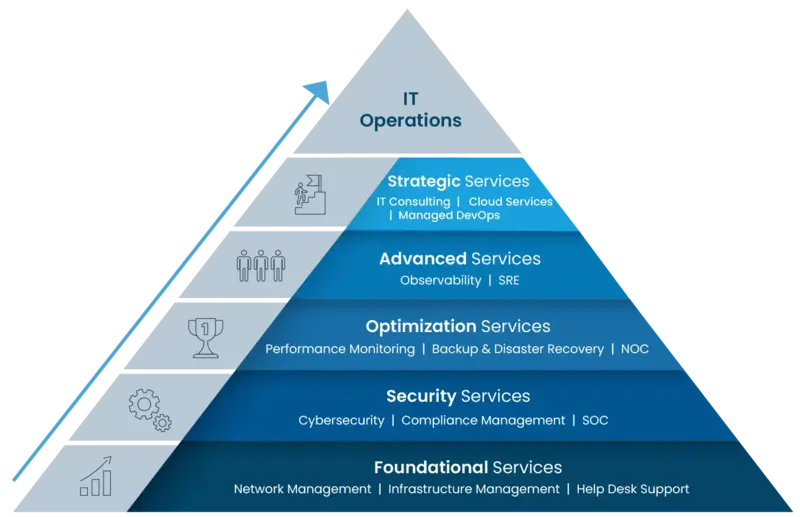

Foundational Services
Network Management
- Network monitoring
- WAN/LAN management
- VPN management
Infrastructure Management
- Cloud performance optimization
- Data center management
- Cloud infrastructure management
Help Desk Support
- 24/7 IT support
- Remote troubleshooting
- On-site support

Security Services
Cybersecurity
- Firewall management
- Intrusion detection and prevention
- Endpoint protection
Compliance Management
- Regulatory compliance support
- Data protection and privacy
- Audit preparation and reporting
Security Operations Center (SOC)
- Threat detection
- Incident response
- Vulnerability management
- Compliance monitoring

Optimization Services
Performance Monitoring
- System performance analytics
- Application performance monitoring
- Database management
Backup and Disaster Recovery
- Data backup solutions
- Disaster recovery planning
- Business continuity services
Network Operations Center (NOC)
- Network monitoring
- Infrastructure management
- Performance optimization
- Incident management

Advanced Services
Observability
- Real-time system insights
- Log management and analysis
- Anomaly detection
Site Reliability Engineering (SRE)
- Proactive issue resolution
- Scalability planning
- Automation and orchestration

Strategic Services
IT Consulting
- IT strategy and planning
- Technology roadmaps
- Digital transformation
Cloud Services
- Cloud migration
- Cloud optimization
- Multi-cloud management
Managed DevOps
- CI/CD pipeline management
- Infrastructure as code
- Continuous integration and deployment
One Trusted Partner for All Your Managed IT Requirements

Network Operations Center (NOC)
- Network Devices: Routers, Switches, Firewalls
- Servers: Physical and Virtual Servers
- Storage Systems: SAN, NAS
- Databases: SQL, NoSQL Databases
- Connectivity: WAN, LAN, VPN
- End-User Devices: Desktops, Laptops, Mobile Devices
- Backup Systems: Backup Servers, Tape Libraries
Security Operations Center (SOC)
- Security Appliances: Firewalls, Intrusion Detection Systems (IDS), Intrusion Prevention Systems (IPS)
- Endpoint Protection: Anti-virus, Anti-malware, Endpoint Detection and Response (EDR) solutions
- Identity and Access Management: Single Sign-On (SSO), Multi-Factor Authentication (MFA)
- Security Information and Event Management (SIEM): Log Aggregation, Event Correlation
- Threat Intelligence Platforms: Threat Feeds, Threat Analysis Tools
- Compliance Tools: Governance, Risk, and Compliance (GRC) Systems
- Data Encryption Solutions: Encryption at Rest, Encryption in Transit


Observability
- Monitoring Tools: Network Monitoring, Application Performance Monitoring (APM)
- Logging Systems: Centralized Log Management, Log Analysis
- Metrics Systems: Time Series Databases, Metrics Collection Tools
- Tracing Tools: Distributed Tracing Systems
- Dashboards and Visualization: Custom Dashboards, Visualization Tools
- Alerts and Notifications: Alerting Systems, Notification Services
Site Reliability Engineering (SRE)
- Automation Tools: Configuration Management, Infrastructure as Code (IaC) Tools
- Orchestration Systems: Kubernetes, Docker Swarm
- CI/CD Pipelines: Continuous Integration/Continuous Deployment Tools
- Cloud Services: Public Cloud (AWS, Azure, GCP), Private Cloud, Hybrid Cloud
- Load Balancers: Hardware Load Balancers, Software Load Balancers
- High Availability Solutions: Clustering, Failover Mechanisms
- Disaster Recovery Solutions: DR Planning, Backup and Restore Systems
- Scalability Tools: Auto-Scaling, Resource Allocation Systems

The Strategic Edge of Observability and SRE for IT Management

- Proactively identify and resolve issues before they impact operations
- Perform root cause analysis for faster incident response
- Continuously optimize and fine-tune systems for peak performance
- Make data-driven decisions for future infrastructure planning
Our Core Focus: Observability and SRE
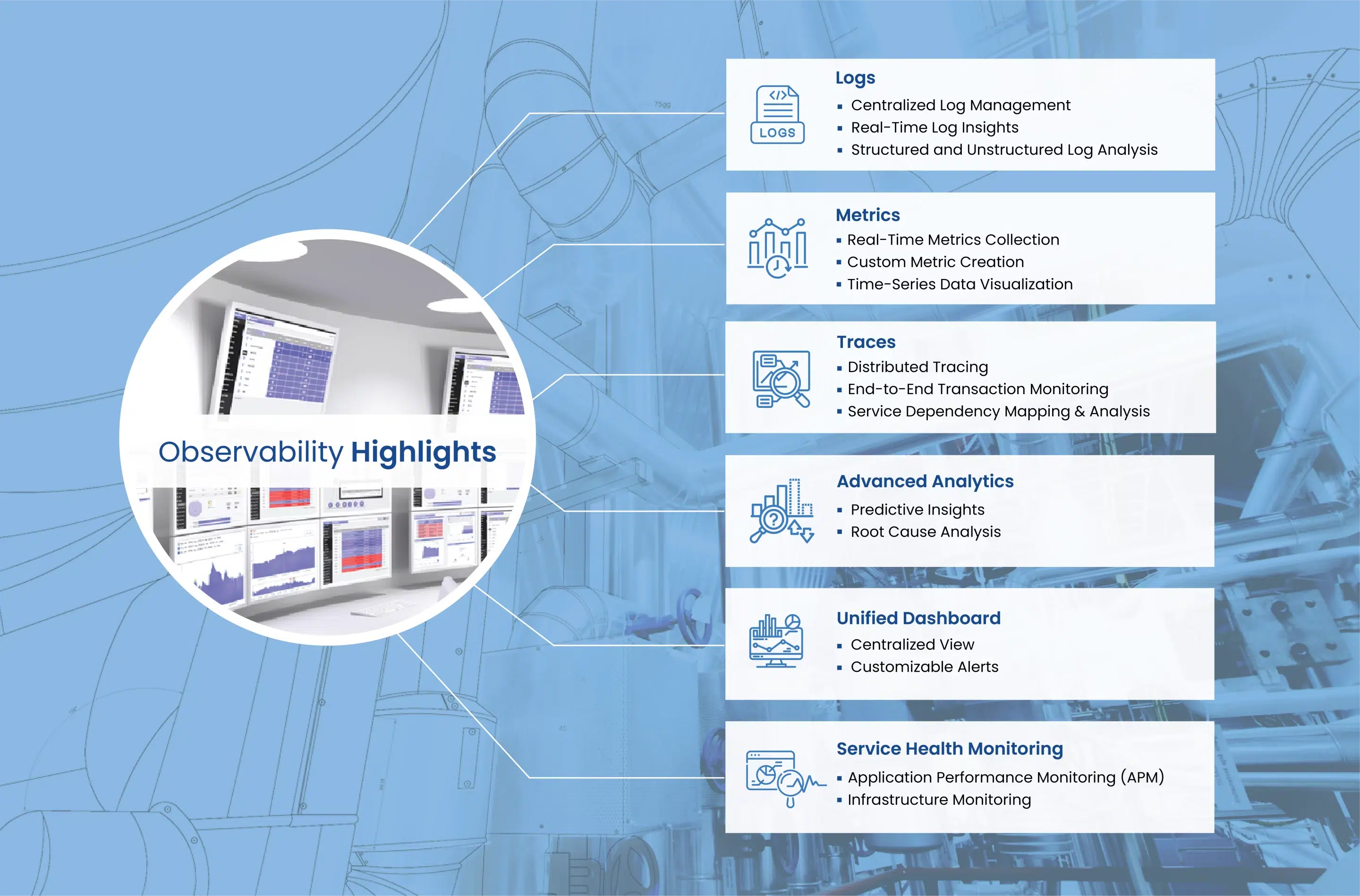
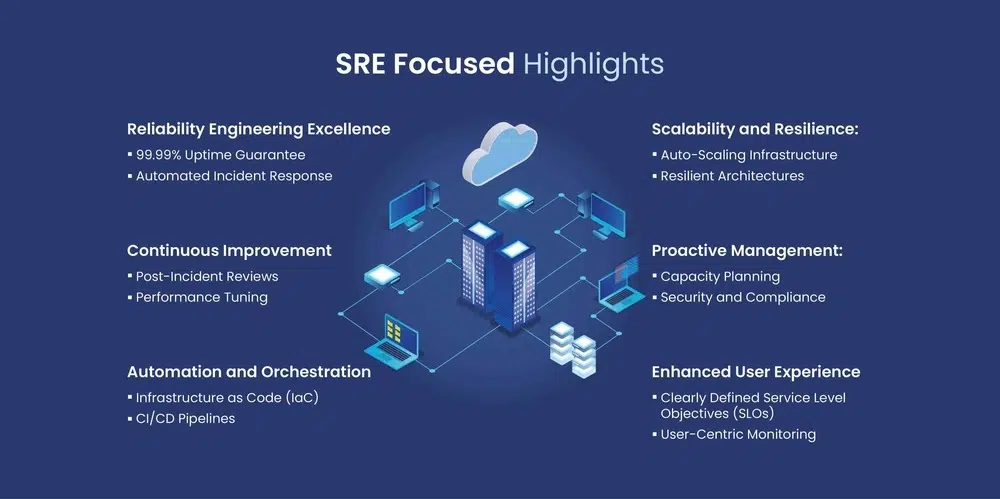

Synchronizing Operational Excellence, Strategic Business Growth, & Groundbreaking Tech
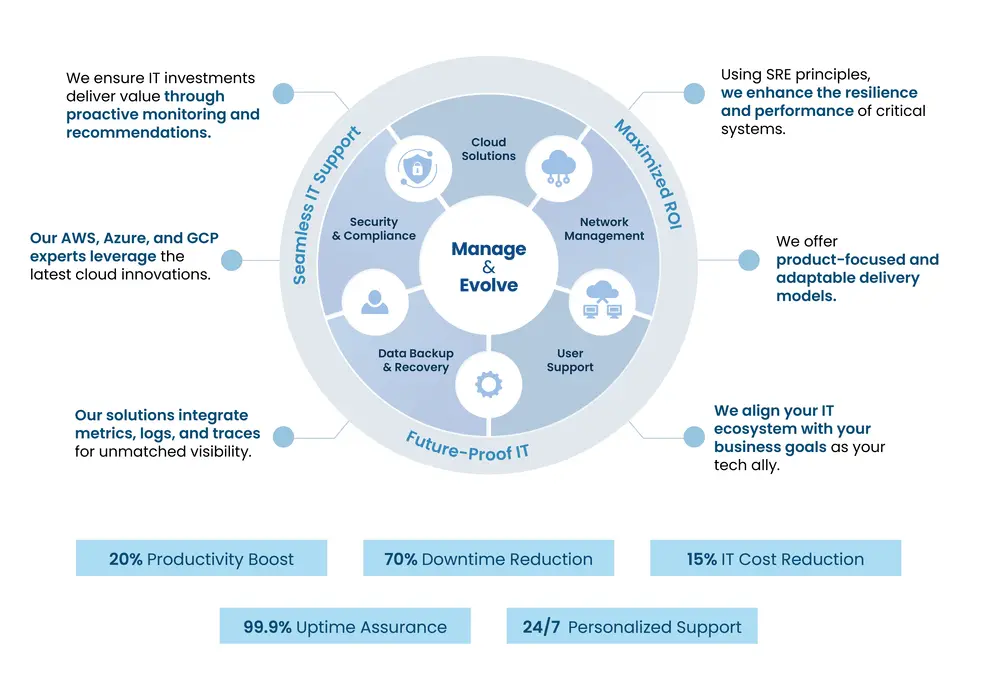
Our Comprehensive IT Management Approach
Monitor
Continuous monitoring of critical systems to detect potential issues before they cause downtime or productivity loss.
Secure
Advanced security stack including next-gen firewalls, encryption, and vulnerability testing.
Maintain
Streamlined management of applications, licensing, hardware procurement, and IT resource lifecycle.
Optimize
Continuous assessment and fine-tuning of IT infrastructure to maximize performance and efficiency.
Support
24/7 assistance from certified experts, leveraging remote tools and tailored solutions to drive efficiency and strategic goals.
Powering Your Business with Our Advanced Tech Stack
Remote Collaborations
Our Diverse Team of IT Specialists
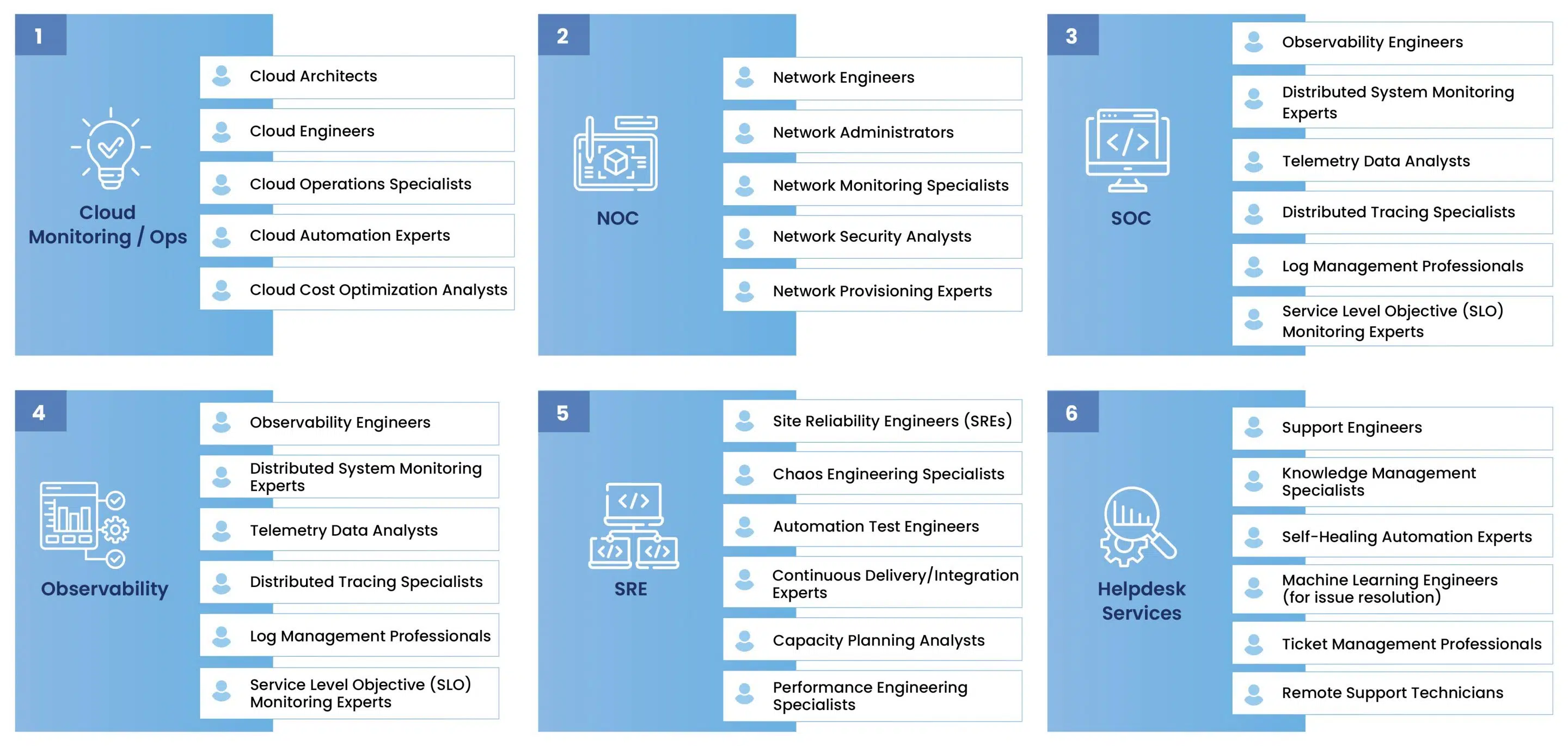
How Utthunga’s Managed IT Services Can Become Your Strategic Advantage
Increased Efficiency
Cost Savings
24/7 Support
Maximized Uptime
On-Demand Tech Expertise
Why Leading Organizations Choose Utthunga’s Managed IT Services

Global Managed IT Provider
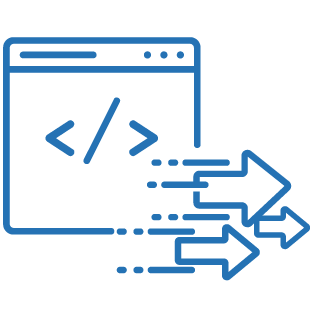
AI/ML-Driven Monitoring

Custom IT Solutions
We take a consultative approach to meticulously design customized digital engineering services that seamlessly align with your specific business needs, processes, and goals.

Zero Trust Security

Intelligent Service Automations

Dedicated Support
Ready to Maximize Uptime and Minimize Disruptions?
FAQs
1. What is Managed IT Services?
Managed IT services are a range of technology solutions provided by a managed IT services company or IT MSP (Managed Service Provider) to remotely support, monitor, and maintain an organization’s IT infrastructure, systems, and applications. Instead of relying solely on on-site staff, businesses can partner with a managed IT services provider to handle day-to-day IT operations, troubleshoot issues, and proactively optimize performance—allowing the organization to focus on growth and innovation.
2. What are the benefits of outsourcing managed IT services?
Outsourcing managed IT services delivers significant advantages for businesses of all sizes:
Cost Savings – Lower labor and overhead expenses by avoiding in-house IT hiring, with predictable monthly costs through managed IT support services.
Access to Expertise – A managed IT services provider brings specialized skills, certified professionals, and access to the latest technologies.
Business Focus – Companies can concentrate on core operations while an IT MSP manages infrastructure and support.
Scalability & Flexibility – Services can easily expand or contract as business demands change.
Efficiency & Productivity – Proactive system monitoring and faster issue resolution minimize downtime.
Enhanced Security – Managed IT services companies employ advanced cybersecurity tools, regular patching, and compliance expertise.
24/7 Support – Around-the-clock availability ensures critical IT issues are quickly resolved.
Compliance & Risk Management – Providers help meet regulatory requirements and reduce IT risks.
Disaster Recovery – Backup and recovery solutions safeguard data and ensure business continuity.
Global Accessibility – Remote managed IT support makes services available across distributed teams.
Competitive Edge – Agility and reliability in IT management help businesses stay ahead.
By partnering with the right managed IT services company, businesses can achieve cost efficiency, stronger security, and operational resilience.
3. What traits should you look for in a managed IT service provider?
When evaluating a managed IT services provider, consider these key qualities:
Technical Expertise – Proven knowledge across infrastructure, security, and cloud services.
Industry Experience – A managed IT services company familiar with your sector’s compliance and best practices.
Proactive Approach – Ongoing monitoring, maintenance, and issue prevention.
Scalability – Ability to grow with your business, whether SMB or enterprise.
Security Focus – Strong cybersecurity policies and data protection measures.
24/7 Availability – Around-the-clock support for critical systems.
Reliability & Redundancy – Systems in place to minimize downtime.
Compliance Knowledge – Expertise in industry-specific regulations (HIPAA, GDPR, etc.).
Flexibility – Tailored solutions that adapt to your organization’s needs.
Cost Transparency – Clear contracts with no hidden fees.
Disaster Recovery – Comprehensive planning for continuity in case of outages.
Innovation – Adoption of emerging IT tools and best practices.
The right managed IT services partner should not only support your current needs but also anticipate future IT challenges.
4. How to select the best managed IT service provider in the US?
Choosing the right managed IT services company requires a strategic approach:
Define Needs – Identify specific IT requirements such as cybersecurity, cloud, network, and support.
Assess Expertise – Look for a managed IT services provider with experience in your industry and a proven track record.
Evaluate Offerings – Ensure comprehensive coverage, from monitoring and helpdesk to disaster recovery.
Check Security & Compliance – Verify adherence to regulations and robust cybersecurity practices.
Review Scalability – Choose an IT MSP that can grow with your business and adapt services.
Examine Support Levels – Prioritize 24/7 monitoring and proactive maintenance.
Compare Pricing Models – Balance cost and value, ensuring transparency and measurable ROI.
Selecting the best managed IT services provider means aligning expertise, scalability, and security with your business goals—ensuring long-term IT resilience and efficiency.
5. What kind of experts make up Utthunga’s managed IT services team?
Utthunga’s managed IT services team brings together specialists across multiple domains to deliver reliable, end-to-end IT solutions:
Cloud Monitoring & Operations – Cloud architects, engineers, automation experts, and cost optimization specialists.
NOC (Network Operations Center) – Network engineers, administrators, monitoring specialists, and security analysts.
SOC (Security Operations Center) – Threat monitoring experts, observability engineers, and incident response professionals.
Observability & SRE – Distributed system monitoring experts, performance engineers, and site reliability engineers.
Helpdesk Services – Support engineers, automation specialists, and remote support technicians.
This multidisciplinary team ensures Utthunga operates not just as a managed IT services company, but as a trusted IT MSP partner—combining cloud, security, and infrastructure expertise to deliver tailored solutions for every client.
6. What should I ask a managed IT services provider?
When speaking with a managed IT services provider, focus on questions that reveal their reliability and expertise. Ask about response times, service-level agreements, cybersecurity capabilities, disaster recovery planning, and experience in your industry. A trusted managed IT services company should also provide clear pricing, transparent reporting, and a dedicated support structure.
7. What's the difference between managed services and outsourcing?
Outsourcing typically refers to contracting a third party for specific, one-time projects or tasks, such as software development or hardware installation. Managed services, on the other hand, involve an ongoing partnership where an IT MSP (managed service provider) takes responsibility for proactively monitoring, managing, and supporting your IT environment. In short, outsourcing is project-based, while managed IT services are continuous and strategic.
8. What security measures do MSPs have in place?
A reputable managed IT services company will prioritize security at every level. Common safeguards include 24/7 network monitoring, advanced firewalls, data encryption, endpoint protection, and compliance with regulatory standards. Many IT MSPs also provide proactive threat detection, vulnerability assessments, and rapid incident response to minimize risks and keep your systems protected.
9. Can managed IT services be tailored to my business needs?
Yes, managed IT services are designed to be flexible. A skilled managed IT services provider can customize solutions based on your business size, industry, and compliance requirements. Whether you need full IT management, co-managed support, or specialized services such as cloud migration or cybersecurity, the right managed IT services company can tailor a plan that scales with your goals.











